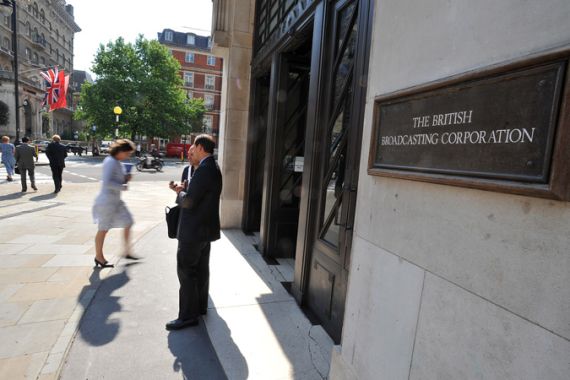BBC set to announce deep cuts
World’s biggest broadcaster to reduce annual budget by 20 per cent under a deal struck with UK government a year ago.

 |
| The BBC has been asked by the UK government to take on extra costs such as funding BBC World Service radio [EPA] |
The BBC is set to announce proposals for deep cuts to its programming and staff numbers day as the publicly funded broadcaster prepares to implement savings imposed by the British government.
The world’s biggest broadcaster has to cut 20 per cent of its annual £3.5bn ($5.4bn) budget under a deal struck with the government a year ago, when the country’s deepest public-spending cuts in decades were being planned.
Keep reading
list of 4 itemsUS imposes new sanctions on Iran after attack on Israel
A flash flood and a quiet sale highlight India’s Sikkim’s hydro problems
Why is Germany maintaining economic ties with China?
The BBC has eight national TV channels, 50 national, regional and local radio stations and an extensive website.
Its size and resources have attracted envy and criticism from rivals, led by BSkyB , especially as advertising-funded rivals are hit hard by the recession.
Last year, the BBC agreed to freeze the annual licence fee of £145.50 pounds payable by every TV-owning British household.
It is also taking on extra costs from the government including funding BBC World Service radio, which is broadcast overseas.
The funding comes to an end in April 2014 as the BBC World Service transfers to television licence fee funding.
The BBC Trust chairmanm, Lord (Chris) Patten said in a BBC interview the trust was in talks with senior executives about how they could “accommodate the BBC” to the new budget.
“But, for heaven’s sake, we’re talking about the BBC running for the next five years on £3.5bn a year. Plus the income it can raise from its commercial activities,” he said.
“Now we should be able to run a damn good public broadcaster on three and a half billion a year.”
The agreement between the director-general of the BBC and the government was hammered out in haste, stripping out the months of negotiation normally involved, as the coalition government scrambled to cut its spending after taking power.
The BBC towers over Britain’s media landscape with a rich offering of drama, comedy and children’s programming, a huge newsgathering operation and some of the UK’s most popular websites.